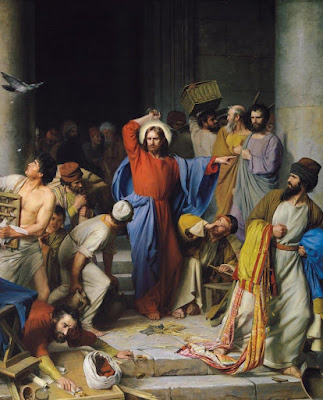The Church teaches us that religion is more than just the vertical dimension of the spiritual life. It’s more that simply “God and me.” Ethics and morality must be the practical expression of a true and living faith. How we conduct ourselves in the marketplace reflects our relationship with God. Certain business practices may be legal but that doesn’t ensure they are ethical. Certainly, making a profit isn’t condemned in Scripture, but accumulating great wealth by unjustly taking advantage of someone else is.
So, with the crack of a whip, Christ drove the money changers from the temple. And He did it not only because of the contempt that was being shown to the Temple – a place consecrated to God – but also because of the injustice being shown to the people who were there to worship the God in whose honour the Temple had been built. Christ was not kind and gentle that day.
When good people are faced with evil, it would seem that our Lord has given something of an example to follow. He did not limit Himself to prayer or to talk; He also did something about it. “To everything there is a season,” the Scriptures tell us, and we can see that even in the life of Christ that there was a season to make a stand against evil by taking specific action.
It was necessary for Christ to drive the money-changers out of the temple because of the evil they had brought into the lives of honest people, and because of the dishonour those actions brought to the House of God. So it is necessary at times that evil must be faced squarely by taking positive action, so that the common good might be preserved. Sometimes, for the triumph of good, the whip must be cracked, and evil must be beaten back.
Whether it be civil leaders inflicting injustice on people; or whether it be those who steal the right to life from the unborn; or whether it be the unfaithful cleric who cheats people from knowing the fullness of the Gospel and from worshipping according to the mind of the Church; or whether it be the gossip who destroys the reputation of another – we are called to stand up for the good, and against the evil.
The Gospel tells us that after Christ had cleansed the Temple, “his disciples remembered that it was written, ‘Zeal for your house will consume me...’” And so should zeal for the things of God consume us. Zeal is the business side of love, whether it be love of God or love of man. “Zeal,” says St. Thomas Aquinas, “is the energy of love.” Zeal, as an ardent love of God, is to be shown in our lives as a desire to promote the love of God, to promote the worship of God, to promote the praise of God, to promote the glory of God. It is to be shown in our spiritual lives as we perform those Christian works of mercy and love that we have been taught by our Lord. And zeal, also, is to be shown in practical ways, as we accept our responsibility for the support and work of Christ’s Body the Church. This is one of the reasons we have places of beauty, consecrated to the glory of God – so that we can be inspired to be zealous for God and for the things of God; so that we can work for justice in this world; so that we can spread the truth of the Gospel by our words and our actions – and also, to give us a glimpse of the eternity of heaven.
_____________________________________________
Pictured: "Cleansing the Temple" by Carl Heinrich Bloch (1834-1890)
